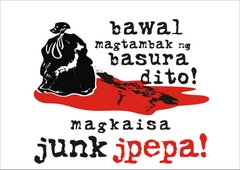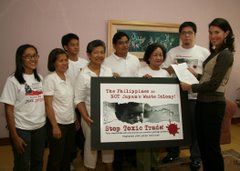
Photo by Gigie Cruz/GAIA.
10 September 2007, Pasay City. Marking the anniversary of the signing of the Japan-Philippines Economic Partnership Agreement (JPEPA), civil society groups from the Magkaisa Junk JPEPA Coalition (MJJC) converged today at the Philippine Senate to signify the people’s intention to keep a close eye on the hearings.
Laborers, nurses, environmental advocates and other concerned citizens carrying 13 giant papier mache eyeballs and a huge banner reading “The people are watching... Magkaisa, Junk JPEPA!” lined up at the Senate People’s Park to appeal to the Senators not to ratify the mega treaty.
Photo by Gigie Cruz/GAIA.
 The organizers explained that the eyeballs represent the yearning of the Filipino people for a robust, honest and transparent debate on multiple issues that continue to hound the controversial treaty signed by President
The organizers explained that the eyeballs represent the yearning of the Filipino people for a robust, honest and transparent debate on multiple issues that continue to hound the controversial treaty signed by PresidentGloria Macapagal-Arroyo and then Japanese Prime Minister Junichiro Koizumi in Helsinki, Finland on 9 September 2006. Japan’s Diet ratified the agreement last 6 December 2006; it is currently awaiting ratification in the Philippine Senate.
The Magkaisa Junk JPEPA Coalition reiterated the civil society’s call to reject the treaty. “The more we study the full text of the JPEPA, the more we become convinced that the Senators should cross party lines and reject it out of hand,” said Atty. Golda Benjamin, lead counsel for the MJJC. “We have faith in this Senate’s ability to transcend political differences and act as one to defend the interests of the Filipino people,” Benjamin added.
Photo by Gigie Cruz/GAIA.
 Foremost amongst the issues being leveled against the treaty is the lack of transparency during the negotiation process. Critics from civil society as well as lawmakers from both houses of the Congress have slammed JPEPA for the secrecy shrouding its inception.
Foremost amongst the issues being leveled against the treaty is the lack of transparency during the negotiation process. Critics from civil society as well as lawmakers from both houses of the Congress have slammed JPEPA for the secrecy shrouding its inception.In 2005, civil society groups and members of the House of Representatives were forced to file a case in the Supreme Court for the JPEPA negotiators to disclose the full text of the agreement. In 2007, detained mutineer Captain Nicanor Faeldon filed graft charges before the Office of the Ombudsman against government negotiators after finding JPEPA to be “grossly disadvantageous” to the Filipino people.
“A treaty should be negotiated with as much public participation as possible,” Atty. Benjamin stated. “The mystery surrounding the negotiation process puts the whole affair in a bad light. If the JPEPA is really all that they say it is, then the government shouldn’t be afraid of public scrutiny. The whole process begs the question, ‘What are they hiding?’”
*** end***
More photos:

Photo by Gigie Cruz/GAIA.

Photo by Gigie Cruz/GAIA.

Photo by Gigie Cruz/GAIA.

Photo by Gigie Cruz/GAIA.






No comments:
Post a Comment